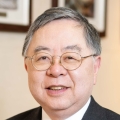Accidental Conflict: America, China, and the Clash of False Narratives
VIEW EVENT DETAILSBook Talk with Stephen Roach

RUNDOWN
Private Reception, and Meet and Greet for President’s Circle Members & Corporate Members
11:45 Start
12:15 Close
Public Program
12:30 Lunch Start
13:00 Close
13:05 Conversation between Mr. Roach and Mr. Chan
14:00 Book Signing
14:20 End
China-US tensions, from trade and technology to Taiwan and military competition, are on an ominous trajectory. In Stephen Roach's latest book, Accidental Conflict: America, China, and the Clash of False Narratives, the author and economist guides readers through the evolution of the increasingly dysfunctional relationship between these two great powers, and considers how worst-case outcomes may still be averted. In conversation with Ronnie C. Chan, Chairman of Asia Society Hong Kong center, Mr. Roach will discuss the key messages of his book and what the future portends for the world’s most important bilateral relationship.

A rare combination of thought leadership on Wall Street and academia qualifies Stephen Roach as a leading practitioner of analytical macroeconomics. After thirty years at Morgan Stanley, mainly as the firm’s chief economist and eventually as the Hong Kong-based Chairman of Morgan Stanley Asia, he joined the Yale faculty in 2010 where he developed popular new courses — “The Next China” and “The Lessons of Japan.”
A forecaster by training in his early days as a Fed economist, Stephen Roach has long been mindful of the perils of historical extrapolation. As seen through that lens, his vision of the “Next China” offers a unique template for the exciting but daunting possibilities of China’s uncertain future. Roach’s focus on the US-China relationship is an outgrowth of the interplay between two major strands of his professional experience—as a leading US economist and an influential analyst of a rising China. His two most recent books—Accidental Conflict (2022) and Unbalanced (2014)—draw extensively on that focus. He has a Ph.D. in economics from New York University and lives in New Canaan, CT.

Ronnie C. Chan (Moderator) is the Chair of Hang Lung Group Limited and its subsidiary Hang Lung Properties Limited, both publicly listed in Hong Kong. The Group expanded into mainland China in 1992, developing, owning, and managing world-class commercial complexes in key tier-one and tier-two cities. He founded and chairs the China Heritage Fund, is a co-founding Director of The Forbidden City Cultural Heritage Conservation Foundation in Beijing, and is a former Vice President and former Advisor of the China Development Research Foundation in Beijing. Mr. Chan is a Fellow of the American Academy of Arts and Sciences, Chair Emeritus of the Asia Society and Chairman of its Hong Kong Center, and Co-Founder and Chairman of the Centre for Asian Philanthropy and Society. He serves or has served on the governing or advisory bodies of several think tanks and universities, which include: Peterson Institute for International Economics, World Economic Forum, East-West Center, Pacific Council on International Policy, Eisenhower Fellowships, The Maureen and Mike Mansfield Foundation, University of Southern California, Indian School of Business, The Hong Kong University of Science and Technology, Yale University, Tsinghua University, and Fudan University.
Book Excerpt

Accidental Conflict: America, China, and the Clash of False Narratives
(Available to pre-oder from our online store)
My previous book, Unbalanced: The Codependency of America and China, ended with a warning that now seems painfully obvious. I feared the codependent economic relationship between America and China might go terribly wrong. Unfortunately, that is what happened. The open conflict now evident between the world’s two most powerful nations is the outgrowth of an inherently precarious codependency.
We should have seen it coming. Relationship conflict arises when there is a profound shift in the terms of engagement between two partners. When Unbalanced was published in 2014, the two nations were at a fork in the road. One path would be delineated by what I called an asymmetrical rebalancing—where one partner changed and the other didn’t. The other, more symmetrical path would be forged by the willingness of both partners to change. The asymmetrical path was a recipe for conflict. Symmetry would avoid conflict and allow each nation to meet its growth and geostrategic challenges in a collaborative spirit that bordered on harmony. The choice was theirs.
There is no dark secret as to what happened: China changed while America remained stuck in its ways. In part, this shift stemmed from China’s inevitable growth challenges. A spectacular takeoff of 10 percent annual economic growth from 1978 to 2007 took its economy to a critical threshold. With per capita income having risen more than tenfold over that period, China was rushing headlong toward the challenging zone of the “middle-income trap,” where setbacks are more the rule than the exception.
For China, this was a clarion signal to change. And that is exactly what it did. With prescient foresight, or serendipitous good fortune, China embarked on the road to rebalancing, shifting its sources of economic growth away from an increasingly unstable external sector toward internal private consumption and indigenous innovation. But the changes in China have gone far beyond economic rebalancing—there has also been an equally dramatic and worrisome tilt in its political economy of power and ideology. With the United States clinging to a timeworn growth model and increasingly consumed by social and political polarization, the die was cast: a destabilizing dynamic between the two nations has led to a full-blown trade and technology war.
This tilt in the relationship dynamic underscored the paradox of the Next China—that China’s emergence as a major engine of global economic growth turned into an uncomfortable ascendancy for established world powers. But it did more than that. It also unmasked the great American paradox of a savings-short global power that had long prospered well beyond its means. Conflict took on a life of its own, bringing an increasingly treacherous endgame into focus. Notwithstanding the darker warnings of history, the rising power was indeed clashing with the incumbent hegemon.
It didn’t have to go this way, and there is still a chance to avoid the worst-case outcome. The big question is whether both powerful nations have the vision and, ultimately, the political will to resolve this conflict before it is too late. As Henry Kissinger has put it, the United States and China are now in the “foothills” of a new cold war. Predictably, codependency has entered the danger zone of conflict escalation. For America and China, a new framework of engagement and coexistence is an increasingly urgent priority. And so we begin where Unbalanced left off.
For more information about Stephen Roach and this book, check out: stephenroachauthor.com
The views and opinions expressed are those of the speakers and participants and, unless expressly stated to the contrary, do not reflect the opinion, position, or official policy of Asia Society Hong Kong, its members, or its committees. Asia Society Hong Kong does not endorse or approve, and assumes no responsibility for the content of the information presented.
Event Details
Asia Society Hong Kong Center, 9 Justice Drive, Admiralty
